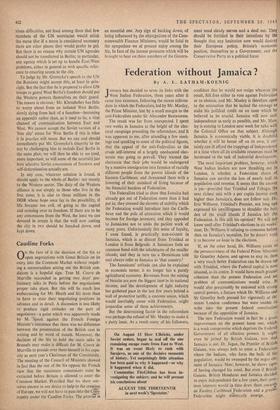Caudine Forks
r‘N the face of it the decision of the Six to IL/open negotiations with Great Britain on its entry into the Common Market without requir- ing a memorandum setting out the British con- ditions is a hopeful sign. True M. Couve de Murville succeeded in getting two days' pre- liminary talks in Paris before the negotiations proper take place. But this will be much less embarrassing for Mr. Heath and his team than to have to state their negotiating positions in advance and in detail. A discussion is less likely to produce rigid attitudes on the part of negotiators—a point which was apparently made by M. 'Spaak against the French Foreign Minister's Insistence that there was no difference between the presentation of the British case in writing and by word of mouth. Moreover, the decision of the Six to hold the main talks in Brussels may make it difficult for M. Couve de Murville to preside over them himself in his capa- city as next year's Chairman of the Community. The meeting of the Council of Ministers showed in fact that the rest of the Six oppose the French view that the maximum concessions must be extracted before Britain is allowed to enter the Common Market. Provided that we show our- selves sincere in our desire to help in the creation of Europe, we will not have to pass into the Com: menity under the Caudine Forks. The proviso is an essential one. Any sign of backing down, of being influenced by the objurgations of the Com- monwealth Finance Ministers, would be fatal to the sympathies we at present enjoy among the Six. In face of the intense pressures which will be brought to bear on them members of the Govern- ment need steady nerves and a deaf ear. They should be fortified in their intentions by the thought that any hesitation now would destroy their European policy, Britain's economic position, themselves as a Government, and th Conservative Party as a political force.






































 Previous page
Previous page